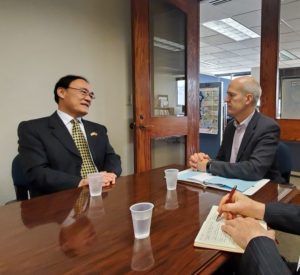Dear WSCRC Members and Friends,
The Washington State China Relations Council hopes you are doing well despite the uncertainty and challenges brought upon by COVID-19. In response to this crisis, governments at the federal, state, and local levels have created assistance programs to help businesses and their workers to withstand these difficult times. Public health organizations publish and advocate guidance on how to protect yourself, your family, and your workplace. The amount of information available can be daunting. We did some research and collected a list of resources that are most relevant to businesses and individuals in the region to share with you. We are hoping this will provide a useful one-stop shop for information and save you time navigating these various resources. We will update the list as the situation develops.
Even though we are not able to host regular events and programs at this time, we are working very hard to organize webinars on COVID-19, bringing experts in related field t to share insights and best practices in response to this situation.
The trade war and coronavirus have inevitably made it challenging, more than ever, to promote stronger U.S.-China relations. We hope you stand with us and continue your critical support of the mission of the WSRCR.
Stay safe and stay healthy.
J. Norwell Coquillard
Man Wang

The Governor’s office COVID-19 resource list for impacted Washington businesses and workers: https://www.governor.wa.gov/issues/issues/covid-19-resources/covid-19-resources-businesses-and-workers
- This list includes information on available financial assistance (including SBA loans), export assistance, employer and works assistance, and insurance assistance.
- Please note for the Small Business Administration’s Economic Injury Disaster Loans, the following counties are currently eligible to apply: Grays Harbor, Island, Jefferson, King, Kitsap, Klickitat, Mason, Pacific, Pierce, San Juan, Thurston, Walla Walla, Whatcom, and Whitman. According to Washington State Department of Commerce, more counties are likely to become eligible in Washington State.
City of Seattle’s Resource list: http://www.seattle.gov/mayor/covid-19
- This list provides information on support to: healthcare, immigration-related issues, food support, utility bills, worker/artist support, small business/non-profit support, and home education support. It’s worth noting a few assistance measures created for small businesses and non-profits, including
- B&O Tax Deferment
- City of Seattle Small Business Stabilization Fund – an emergency fund that’s approximately $1.5 million that provides working grants up to $10,000 to qualifying small businesses. http://www.seattle.gov/office-of-economic-development/small-business/small-business-programs-/stabilization-fund-
- COVID-19 Response Fund – a one-time operating fund created by a coalition of philanthropy, government, and business governors and hosted by Seattle Foundation. It will provide support to organizations working with communities who are disproportionately impacted by coronavirus. For more information, please visit https://www.seattlefoundation.org/communityimpact/civic-leadership/covid-19-response-fund.
Lists of banks offering assistance to customers affected by Coronavirus https://www.bankrate.com/banking/coronavirus-list-of-banks-offering-help-to-customers-financial-hardship/

Washington State Department of Health https://www.doh.wa.gov/Emergencies/Coronavirus (available in multiple languages)
- This website provides information on symptoms and testing, coronavirus fact sheet and educational materials, industry-specific response guidance, and updates on coronavirus development in Washington State.
Public Health – Seattle and King County https://www.kingcounty.gov/depts/health/communicable-diseases/disease-control/novel-coronavirus.aspx (some information available in multiple languages)
- In addition to regularly updating the coronavirus situation in King County, this site provides import resources for the general public, schools and childcare, workplaces and employers, community and faith-based organizations, and travelers.
- Information on Public Health Recommendations is available in multiple languages. Here is the link to the Chinese version https://www.kingcounty.gov/depts/health/communicable-diseases/disease-control/novel-coronavirus/protection/chinese.aspx
Port of Seattle COVID-19 Response Page https://www.portseattle.org/news/updates-ports-covid-19-response
- Provide updates on SEA airport, maritime facilities, and employees and community partners.
Snohomish County COVID-19 Response page https://snohomishcountywa.gov/5589/COVID-19-Response
- Snohomish Health District provides up-to-date resources and guidance in the region https://www.snohd.org/484/Novel-Coronavirus-2019
Center for Disease Control and Prevention https://www.cdc.gov/coronavirus/2019-ncov/index.html
- Frequently Asked Questions are available in Chinese https://www.cdc.gov/coronavirus/2019-ncov/faq.html
World Health Organization https://www.who.int/emergencies/diseases/novel-coronavirus-2019; https://www.who.int/zh/emergencies/diseases/novel-coronavirus-2019 (Chinese page)
- When to use a mask https://www.who.int/emergencies/diseases/novel-coronavirus-2019/advice-for-public/when-and-how-to-use-masks
- Coronavirus myth busters https://www.who.int/emergencies/diseases/novel-coronavirus-2019/advice-for-public/myth-busters
 Consul General Wang Donghua of the Chinese Consulate in San Francisco spent Friday February 14th visiting government officials in Everett, Seattle and Tacoma. WSCRC made the arrangements for the day which started with a meeting with Congressional Representative Rick Larsen in his field office in Everett. After discussions about the coronavirus the CG and Representative Larsen had a frank discussion about reciprocity and agreed to disagree on number of points noting that the difference in governing systems in our two countries can create misunderstandings.
Consul General Wang Donghua of the Chinese Consulate in San Francisco spent Friday February 14th visiting government officials in Everett, Seattle and Tacoma. WSCRC made the arrangements for the day which started with a meeting with Congressional Representative Rick Larsen in his field office in Everett. After discussions about the coronavirus the CG and Representative Larsen had a frank discussion about reciprocity and agreed to disagree on number of points noting that the difference in governing systems in our two countries can create misunderstandings.

